#chinese folklore
Text
One nerd's musing about Chinese religion and "respect"
-I try to stay away from fandom discourse, but, much like how you can smell the stench from a dumpster fire without walking into said dumpster fire, I've noticed something that seemed to come up a lot in western JTTW + adjacent fandoms: "respect Chinese religion".
-Usually as a reason for why you shouldn't ship a character, because of fucking course it's shipping discourse too.
-And my first reaction is "Man, you are taking Chinese religion too darn seriously, more than people who are born and raised in China."
-My second reaction is "I mean, most of us are atheist/agnostic by default anyways, with a good number of what I'd call 'atheist/agnostics with superstitions': people who said they were not religious, yet believed in Fengshui or divinations and burnt incense at temples for good luck."
-My third reaction: "But why do I get the feeling that when you mention 'Respect', you are thinking about something completely different?"
-Then I reread an essay from Anthony C. Yu, "Religion and Literature in China: The "Obscure Way" of Journey to the West", and the metaphorical lightbulb just lit up over my head.
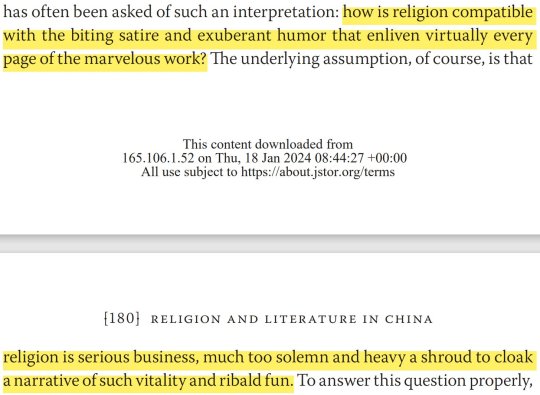

(Everything below applies more to Daoism + associated folk religions, but by the time when most classic Chinese vernacular novels were written, the blending of the three religions had become well and truly mainstream.)
(The conception of gods differs from dynasty to dynasty. What I'm describing here is mostly based on Ming and Qing ones; if you went back to Han or pre-Qin times, most of these would not apply.)
(I am one of the "atheist/agnostic by default" people. I just have an interest in this kind of stuff. I am also just one Chinese person, and an actual Daoist/Buddhist/Religion Studies researcher would probably have a lot more valuable information and perspective to offer when it comes to contemporary practices and worship. Like any people on the internet: take my words with a grain of salt.)
-Even in the past, when society was far less secularized, Chinese gods are not omniscient, perfect beings whose worship is a solemn, humorless affair. Some's worship are Serious Business, but that has more to do with the sort of gods they are and the patronage they enjoy, not godhood in and of itself.
-And even the ones that you are supposed to "treat seriously" are still very human. To use an analogy I've used plenty of times before: you respect and fear them in the same way you'd respect and fear an emperor's official, or the emperor himself, because if you don't, you are not gonna like the consequences.
-However, unlike Jesus, the emperor & his officials were capable of being temperamental, flawed, or an outright asshole, divine or not. Ideally, they wouldn't be, and if you were one of the "serious" believers——people who actually got an official permit, became ordained clergy, and went to live in a temple, you were unlikely to think of your gods in that manner.
-But it wasn't a complete, utter impossibility. The lower you go in the pantheon, the closer you get to popular religion, the less "serious" the gods and their worship become. By that, I mean general attitude, not sincerity of faith. You still shouldn't be rude to them, but, well, they are more likely to take a joke in stride, or participate in the "vulgar" pleasures of commoners because they weren't as bound to Confucian moral standards or religious disciplines.
-To stretch the same analogy further: you should still respect your village head, they could still give your ass a good spanking for being a disrespectful brat, but you were not obligated to get on your knees and kowtow to them like you would do in front of a provincial magistrate, the emperor's minister, or the emperor himself, nor did they have the power to chop your head off just because you were rude.
-On the other hand, the emperor would never visit a random peasant just to help them fix their broken plow or treat them to a nice meal, but your village head could, and your relationship would probably be warmer and a lot more personal as a result.
-Your respect for them was more likely to stem from the things they actually did for you and the village as a whole, instead of something owed to this distant, powerful authority you might never get to see in your lifetime, but could change its course with a single stroke of a brush.
-Now exchange "village head" for your run-of-the-mill Tudis and Chenghuangs and friendly neighborhood spirits (because yes, people worshipped yaoguais for the exact same reasons), emperor + his officials for the Celestial Bureaucracy, and you'd have a basic idea of how Chinese religions worked on the ground level.
-This is far from absolute: maybe your village head was a spiteful old bastard who loved bullying his juniors, maybe your regional magistrate was an honest, upright man who could enjoy a good drink and a good laugh, maybe the emperor was a lenient one and wouldn't chop your head off for petty offenses. But their general degree of power over you and the closeness of your relationships still apply.
-Complicating the matter further, some folk gods (like Wutong) were worshipped not because they brought blessings, but because they were the divine equivalent of gangsters running a protection racket: you basically bribed them with offerings so they'd leave you alone and not wreck your shit. Famous people who died violently and were posthumously deified often fell into this category——shockingly enough, Guan Yu used to be one such god!
-Yeah, kinda like how your average guy could become an official through the imperial examinations, so could humans become gods through posthumous worship, or cultivate themselves into immortals and Enlightened beings.
-Some immortals aren't qualified for, or interested in a position in the Celestial Bureaucracy——they are the equivalent of your hermits, your cloistered Daoist priests, your common literati who kept trying and failing the exams. But some do get a job offer and gladly take it.
-Anyways, back to my original point: that's why it's so absurd when people pull the "Respect Chinese Religion1!!1!" card and immediately follow up with "Would you do X to Jesus?"
-Um, there are a lot of things you can do with Chinese gods that I'm pretty sure you can't do with Jesus. Like worshipping him side by side with Buddha and Confucius (Lao Tzu). Or inviting him to possess you and drink copious amount of alcohol (Tang-ki mediums in SEA). Or genderbend him into a woman over the course of several centuries because folks just like that version of Jesus better (Guan Yin/Avalokitesvara).
-But most importantly, Chinese religions are kinda a "free market" where you could pick and choose between gods, based on their vicinity to you and how efficient they were at answering prayers. You respect them because they'll help you out, you aren't an asshole and know your manners, and pissing them off is a bad idea in general, not because they are some omnipotent, perfect beings who demand exclusive and total reverence.
-A lot of the worship was also, well, very "practical" and almost transactional in nature: leave offerings to Great Immortal Hu, and he doesn't steal your imperial seal while you aren't looking. Perform the rites right and meditate on a Thunder General's visage, and you can temporarily channel said deity's power. Get this talisman for your kids at Bixia Yuanjun's temple, and they'll be protected from smallpox.
-"Faith alone" or "Scripture alone" is seldom the reason people worship popular deities. Even the obsession with afterlife wasn't about the eternal destination of your soul, and more about reducing the potential duration of the prison sentence for you and your loved ones so you can move on faster and reincarnate into a better life.
-Also, there isn't a single "canon" of scriptures. Many popular gods don't show up in Daoist literature until much later. Daoist scriptures often came up with their own gigantic pantheons, full of gods no one had heard of prior to said book, or enjoyed no worship in temples whatsoever.
-In the same way famous dead people could become gods via worship, famous fictional characters could, too, become gods of folk religion——FSYY's pantheon was very influential on popular worship, but that doesn't mean you should take the novels as actual scriptures.
-Like, God-Demon novels are to orthodox Daoism/Buddhism what the Divine Comedy is to medieval Christian doctrines, except no priests had actually built a Church of Saint Beatrice, while Daoists did put FSYY characters into their temples. By their very nature, the worship that stemmed from these books is not on the same level of "seriousness" as, say, the Tiantai school of Buddhism and their veneration of the Lotus Sutra.
-At the risk of being guilty of the same insertion of Abrahamic religion where it doesn't belong: You don't cite Dante's Inferno in a theological debate, nor would any self-respecting pastor preach it to churchgoers on a Sunday.
-Similarly, you don't use JTTW or FSYY as your sole evidence for why something is "disrespectful to Chinese religion/tradition" when many practitioners of said religions won't treat them as anything more than fantasy novels.
-In fact, let's use Tripitaka as an example. The historical Xuanzang was an extraordinarily talented, faithful, and determined monk. In JTTW, he was a caricature of a Confucian scholar in a Buddhist kasaya and served the same narrative function as Princess Peach in a Mario game.
-Does the presence of satire alone make JTTW anti-Buddhist, or its religious allegories less poignant? I'd say no. Should you take it as seriously as actual Buddhist sutras, when the book didn't even take itself 100% seriously? Also no.
-To expand further on the idea of "seriousness": even outside of vernacular novels, practitioners are not beholden to a universal set of strict religious laws and taboos.
-Both Daoism and Buddhism had what we called "cloistered" and "non-cloistered" adherents; only the former needed to follow their religious laws and (usually) took a vow of celibacy.
-Certain paths of Daoist cultivation allow for alcohol and sexual activities (thanks @ruibaozha for the info), and some immortals, like Lv Dongbin, had a well-established "playboy" reputation in folklore.
-Though it was rarer for Buddhism and very misunderstood, esoteric variants of it did utilize sexual imageries and sex. And, again, most of the above would not apply if you weren't among the cloistered and ordained clergy.
-Furthermore, not even the worship of gods is mandatory! You could just be a Daoist who was really into internal alchemy, cultivating your body and mind in order to prolong your lifespan and, ideally, attain immortality.
-This idea of "respect" as…for a lack of better words, No Fun & R18 Stuff Allowed, you must treat all divinity with fearful reverence and put yourself completely at their mercy, is NOT the norm in Chinese religious traditions.
-There are different degrees and types of respect, and not every god is supposed to be treated like the Supreme Heavenly Emperor himself during an imperial ceremony; the gods are capable of cracking a joke, and so are we!
TL;DR: Religions are complicated, and you aren't respecting Chinese religions by acting like a stereotypical Puritan over popular Chinese deities and their fictional portrayals.
#chinese religion#chinese mythology#chinese folklore#fandom discourse#journey to the west#xiyouji#investiture of the gods#fengshen yanyi
56 notes
·
View notes
Text
Lycoris Aurea*
Happiness, courage in adversity, placing hopes in the future.

My HC here: DFS followed the tales of a golden flower blooming in the legendary PéngLái Immortal Island 蓬萊仙島** beyond the Eastern Sea and managed to find it after an arduous journey.
Consumed by them both and combined with their respective blends of YángZhouMàn, BeiFengBáiYáng and the cleansing technics from LXY's master, it successfully cured HuaHua's poison, at the price of half of DFS's inner power***. HuaHua's hair turned totally white in the process.
👩🦳
* Lycoris flowers are actually toxic to humans and animals - do not touch/sniff/eat!
** Of course I picked Formosa/Taiwan among the many theoretical locations for the legendary island and the actual places where the flower is endemic.
*** And I just wanted to draw a-Fei with facial hair 🤭!
For @howling-harpy ♡
...☕?/commission
#mysterious lotus casebook#li lianhua#di feisheng#lycoris aurea#chinese folklore#mlc headcanons#headcanon#cdrama#fanart#cnovelartreblogs#lyselkatzcreations
49 notes
·
View notes
Text

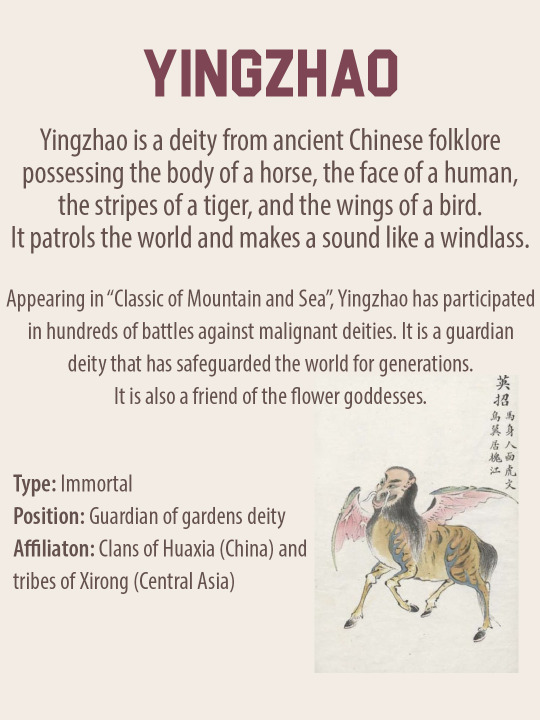
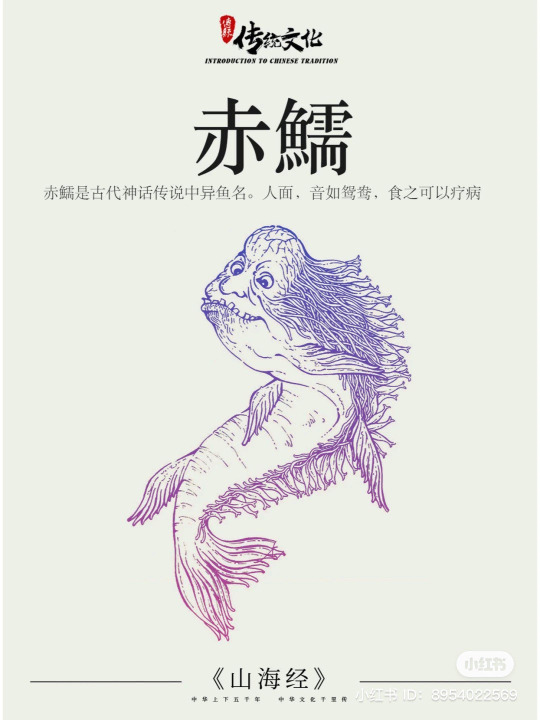

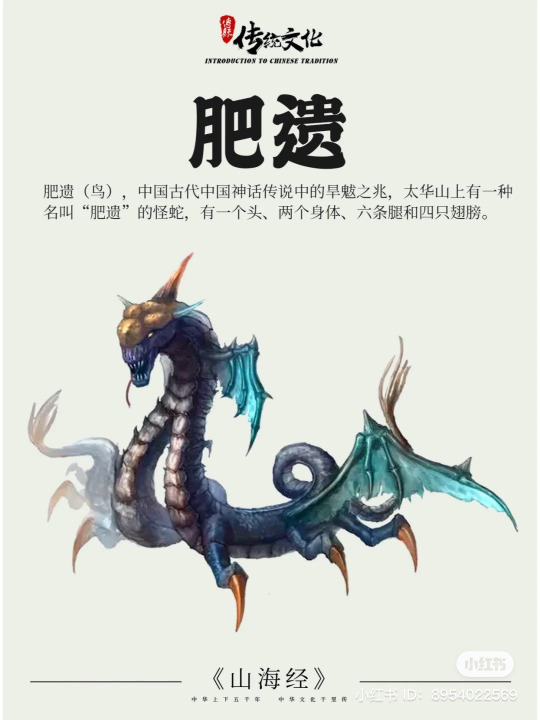

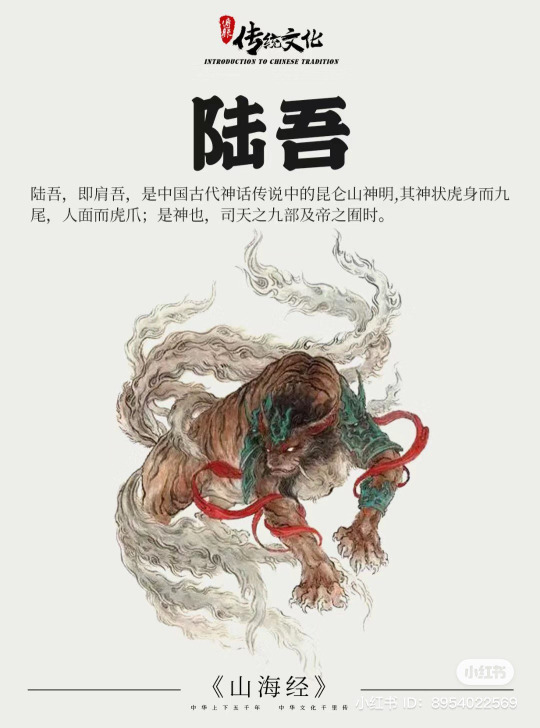
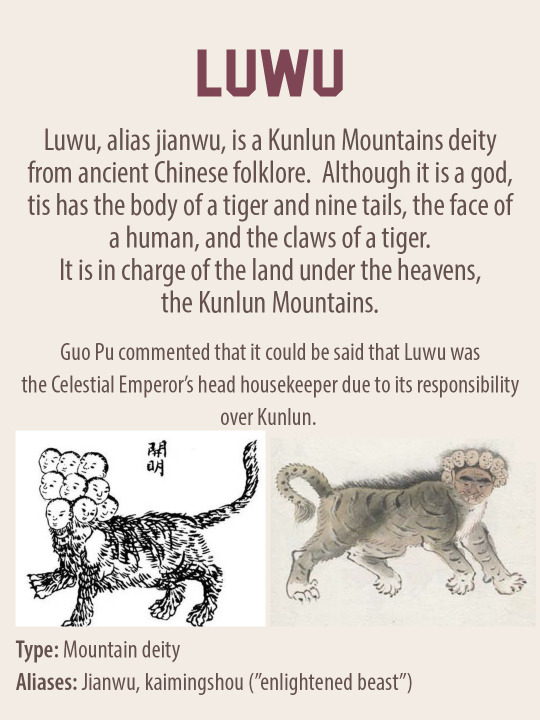
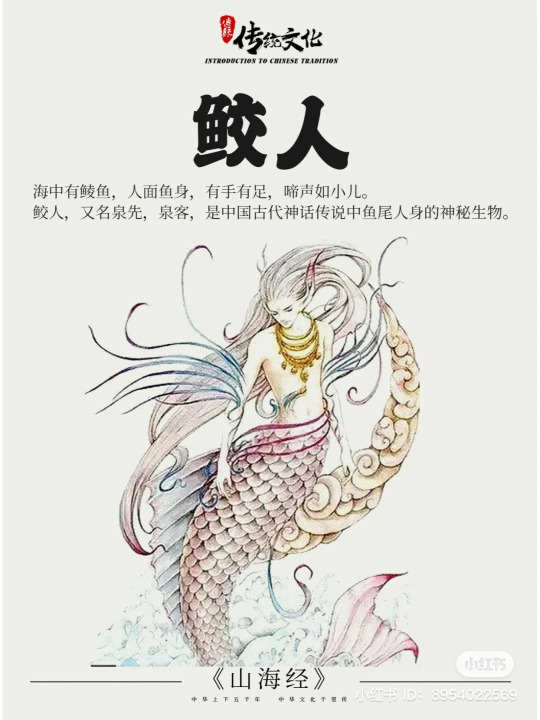

A look at a few mythological beings from 山海经, Classic of Mountain and Sea, compiled beginning around 500 BC with the earliest remaining finished version existing by 200 BC.
Right column graphics created by me, translating the left and adding a few more details.
#chinese folklore#arts#chinese mythology#text#kind of different from what i normally do i guess!#chinese history#mine#if you see any typos in this no you don't bc i didn't either
2K notes
·
View notes
Text
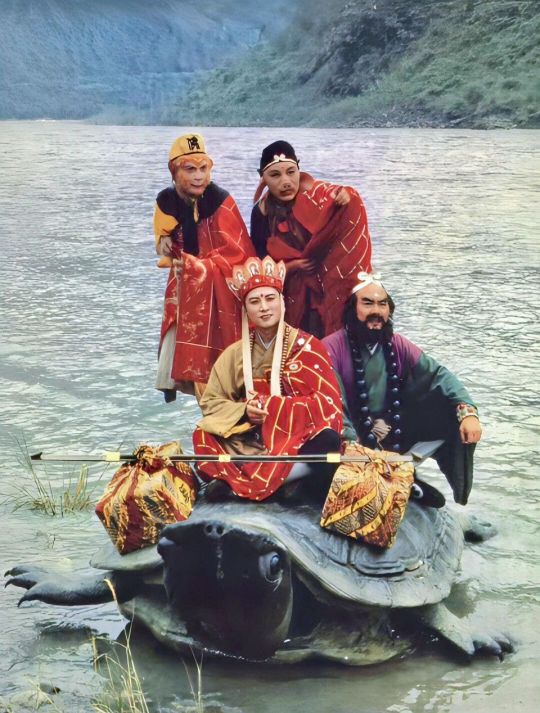
The gang hitch a ride on a friendly turtle.
#Journey to the West#Sun Wukong#Monkey King#Zhu Bajie#Pigsy#Tang Sanzang#Tripitaka#Sha Wujing#Sandy#Chinese mythology#Chinese folklore#turtle
215 notes
·
View notes
Text
Kindred Spirits 知音: "The One Who Truly Understands Your Songs"
For #AroWeek, I want to talk about the Chinese term 知音 (pronounced zhīyīn in Mandarin), which has influenced my thinking about queerplatonic relationships.
zhī 知: to know, knowing
yīn 音: music, sound
literally, a zhīyīn is someone who "truly understands your songs"
the term zhīyīn comes from a story about finding a kindred spirit through music.
There are many versions of the story. Here's one version:
One day, the musician Yu Boya was playing a qin (see image) in the wilderness, when he met Zhong Ziqi.

When Boya played one song, Ziqi immediately understood it and described it as reflecting the mood of soaring mountains (高山). When Boya played another song, Ziqi also comprehended immediately and described it as creating the mood of flowing waters (流水).
Ziqi could understand all of Boya's songs. When Ziqi passed away, Boya felt so distressed that he destroyed his qin and never played it again. Boya thought of Ziqi as a "zhīyīn," and that term continues to be widely used to this day.
In a modern context, the term of "zhīyīn" is often translated into English as a soulmate, a kindred spirit, or a very close friend, but at its core, it's a term that refers to a type of intensely emotional, spiritual, and platonic connection with someone.
The original songs played by Boya have been long lost to the passage of time, but musicians and composers have tried to imagine what the songs might have sounded like.
There's even a recording of "Flowing Waters" (流水) included on the Voyager Golden Record, symbolically helping humankind search for a zhīyīn as it drifts around in outer space.
youtube
For me, as an aspec (demiromantic, biromantic, and asexual) Sino diaspora femme, the idea of zhīyīn offers me a way to think about the concept of queerplatonic relationships, given that it's very similar to the idea of a soulmate but without the necessary romantic connotations of the word in English.
The concept of zhīyīn is explored again and again in various Sinophone literature and popular media, from wuxia and xianxia c-dramas to poetry that alludes explicitly or indirectly to zhīyīn.
Folks who follow my work as a translator might know that I have been translating poems by Qiu Jin (1875-1907), one of China's most renowned feminist poets. She frequently wrote about her longing for a zhīyīn.
Some of my translations:
https://chinachannel.lareviewofbooks.org/2021/02/12/qiu-jin/
The concept of zhiyin also features prominently in my upcoming book of poetry translations, The Lantern and the Night Moths. I originally wrote this thread for Twitter but wanted to bring it here for #AroWeek.
Alloromantic folks, please take a moment to learn more about #AroWeek and support arospec creators. If you are arospec and found me via this tweet, please feel free to say hi!
129 notes
·
View notes
Text


did that one meme resurgence of "i think we gotta kill this guy, steven." its funny how nezha was my first ever blorbo when i was like 4 years old and then 12 years later i picked up a new blorbo who is also an insane demon baby
there is no correlation between steve and phoenix. i wish there was tho
#kiwi’s scribbles#hermitcraft#ace attorney#minecraft#chinese folklore#nezha#evil xisuma#minecraft steve#phoenix wright#crossover content: brought to you by kiwinator
196 notes
·
View notes
Text
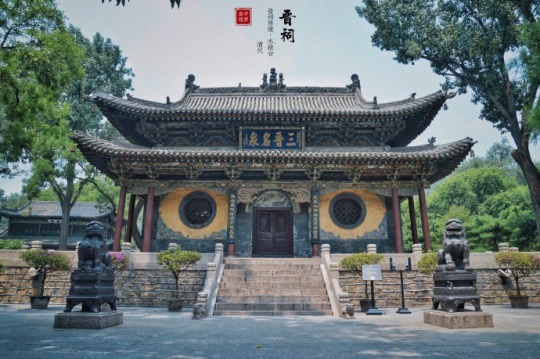
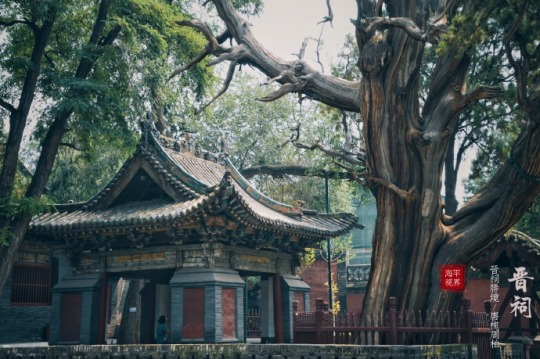
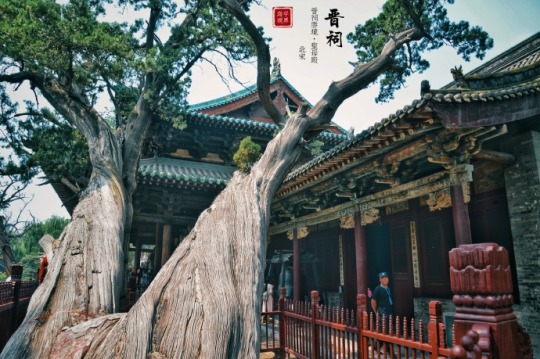
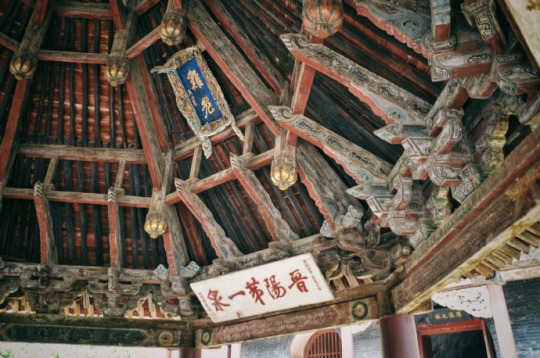
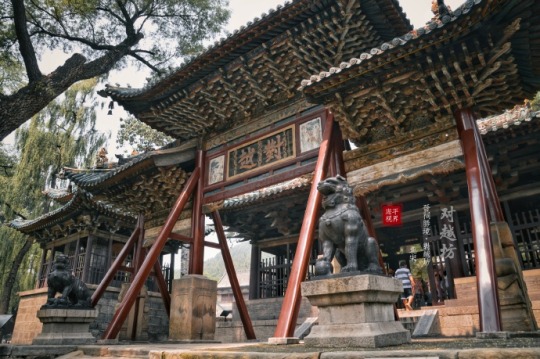
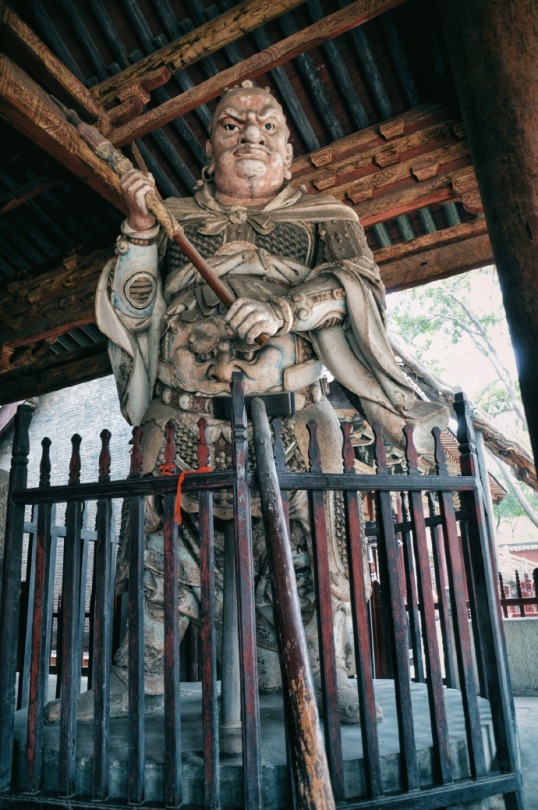
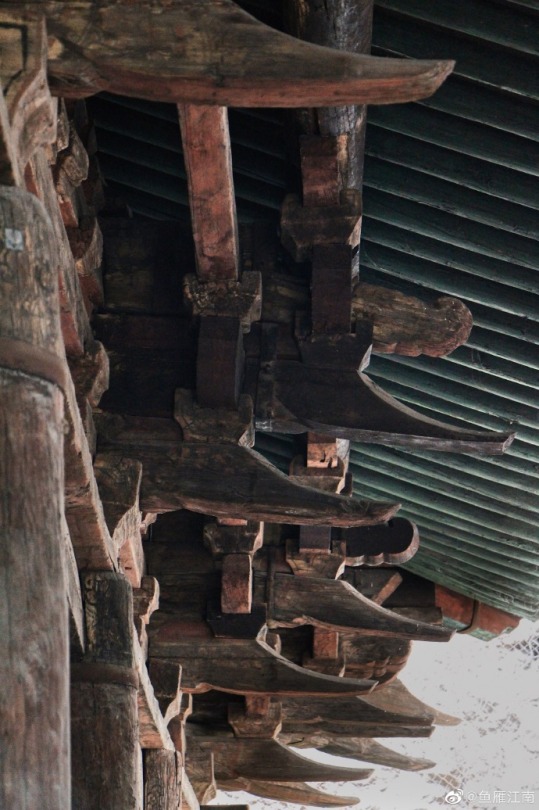

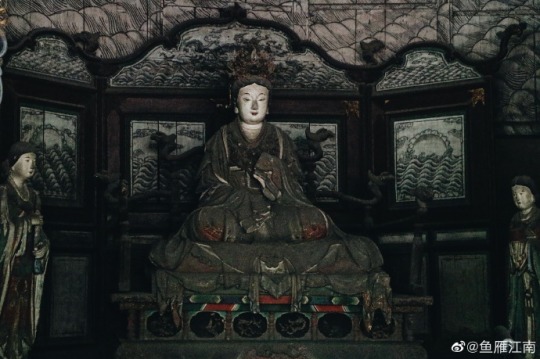
The Hall of the Holy Mother: One of the Oldest Places of Worship
The Hall of the Holy Mother (聖母殿) in Jinci Temple (晉祠), Shanxi. Built during the reign of Emperor Renzong (仁宗) of the Northern Song dynasty (1023-1032).
The hall is part of the ever evolving temple complex founded about one and a half thousand years ago. Over the centuries of countless transformations, it has accumulated buildings of various periods and styles.
The temple is dedicated to Shuimu (水母), The Old Mother of Waters, witch-goddess of Chinese lore, appearing in the form of a dragon, a snake or a charming lady with a sword and a yoke.
Photo: ©鱼雁江南, 雪夜魚舟
#ancient china#chinese culture#chinese mythology#taoism#chinese architecture#song dynasty#wooden architecture#wooden buildings#chinese customs#taoist#chinese folk religion#chinese temple#religious art#temple architecture#taoist deities#goddess#goddess worship#mother goddess#great mother#chinese folklore#dragon art#dragon
252 notes
·
View notes
Text
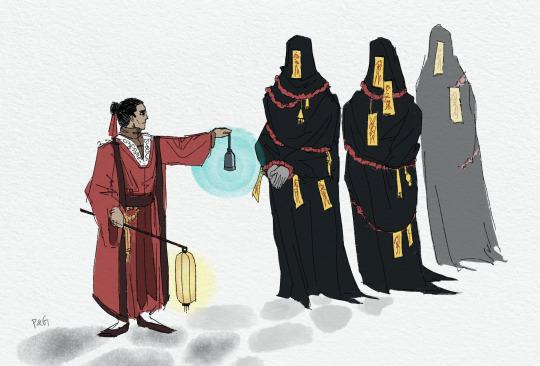
Tis the season of the spooky! I recently delved into a rabbit hole about the 僵尸 (Jiangshi) and 湘西赶尸人 (Xiangxi necromancer), both Chinese folklores regarding the undead. These are very underrated topics so I’ve found some fun info to share under the cut!
僵尸 (Jiangshi) directly translates to ‘rigid corpse’ (corpse with rigor mortis), but it’s better known as the Chinese vampire in pop culture.
Jiangshi is an undead that sustains itself by consuming the energy of the living, and moves about by hopping (cause rigor mortis).
湘西赶尸人 translates directly to the corpse herder of Xiangxi. It is considered as a traditional witchcraft practice of the Xiangxi area, and thought of as ‘good magic’. According to traditional lore, families hire these necromancers so that their loved ones (usually people who died in war) could be returned and buried in their homeland, so to encourage the spirit to pass on properly.
The stereotype of the undead in Qing dynasty officials garb was made popular by horror films and pop culture of the 80s. In traditional folklore, the dead are often clothed in black death shrouds or otherwise have their face covered by large hats. The yellow talisman in movies are depicted to render the undead docile. Here, it is said to be used to keep the spirit within the vessel of the body during transport (I read cinnabar is also used for this purpose).
The necromancer guides the dead with a bell. They would rest during daylight in lodgings specifically made to accommodate this, and only travel at night. This is to avoid frightening the living during day time.
Of course, there is no verifiable proof for this profession, though it is speculated that some sort of performative corpse transportation existed in history that helped to generate this fascinating legend. The usual portrayal of raising the dead in pop culture is often seen as evil and malicious, so it’s a lovely change of pace to see necromancy depicted in a positive manner.

246 notes
·
View notes
Text
I am presently preparing for final exams and wrapping up my final case studies for this semester, but I would like to share an opera that features Nezha outside of the widely known Havoc in Heaven where he is in combat with Sun Wukong. Today, we are going to discuss the opera Chentangguan (陳塘關), known also as The Birth of Nezha (哪吒出世) and Nezha Fights the Sea (哪吒鬧海).
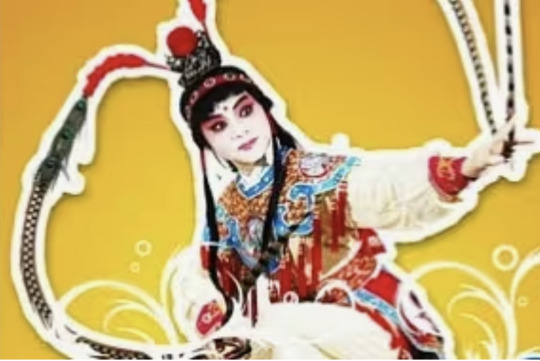
The plot of this opera closely follows the origin story of Nezha as is featured within Canonization of the Gods. A defined year for when this opera was initially performed is unclear, though it was written by Xiao Rongchun and appeared within a registry of operas that featured a 'celebratory ascension' in 1824; an online record of this appears here from the Opera Culture Network.
Outside of Peking Opera, Qin Opera, Hui Opera, and Szechuan Opera also regard the performance as Nezha Fights the Sea whereas Hengqi Opera regards it as Golden Pagoda. The opera is present within Gui Opera, Hunan Opera, Chenhe Opera, and Handiao Erhuang (A form of folk opera exclusive to Shaanxi Province originating in 1807) though it is not as prominent.
This opera alongside it's contemporary art forms also focused heavily on the martial arts aspect of Chinese Opera in regards to Nezha and the varying methods his story was retold. Within this post is a brief taste of how this opera was performed, Nezha himself being played by Xu Yingying in this recording.
The full hour long performance can be found here, though it is not nearly as cinematic and was recorded from a considerable distance.
#nezha#li nezha#lmk nezha#monkie kid nezha#nezha 2019#the legend of nezha#third lotus prince#nezha lego monkie kid#nezha reborn#chinese opera#beijing opera#peking opera#chinese mythology#chinese folklore#chinese performing arts
103 notes
·
View notes
Text

painted skin
72 notes
·
View notes
Text

The two at the beginning are dressed as (left-right) 财神/Caishen and 福星/Fuxing, gods of wealth and fortune/luck, respectively. 月老/Yue Lao, the matchmaker god is seen at the end. They are three gods from Chinese folk religion.
771 notes
·
View notes
Text
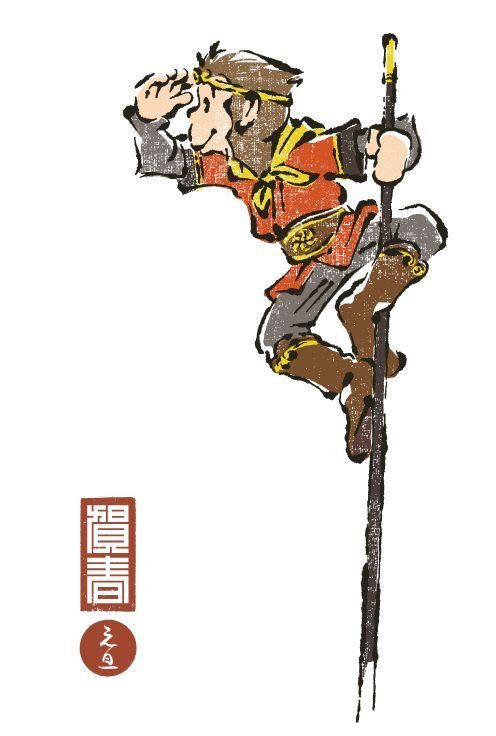
On the look out!
142 notes
·
View notes
Text
Prelim Poll 25
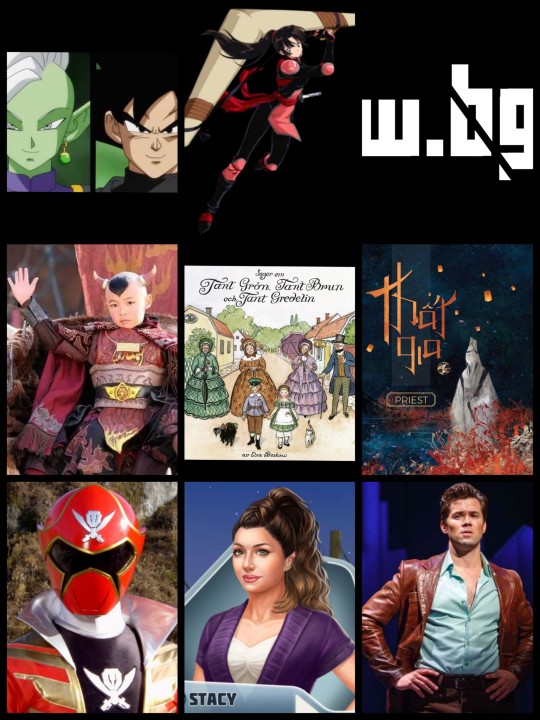
Propaganda here
#tournament polls#colornames battle#prelims#prelim 25#goku black#dragon ball z#dbz goku#zamasu#sango inuyasha#inuyasha#woe.begone#ty betteridge#red boy#chinese folklore#sweden#swedish#qi ye#lord seventh#priest novels#kaizoku sentai gokaiger#stacy green#it lives in the woods#ilitw#whizzer falsettos#whizzer brown#falsettos#bookblr#gameblr#mangablr#animeblr
35 notes
·
View notes
Text

There are types of heavenly realms inhabited by beings full of strength and energy, endowed with many powers, but somewhat "eccentric". These we call the realms of the Yin Deities, a kind of world of demons, beings endowed with consciousness, intelligence and powers far superior to those of humans. They are the antithesis of the Yang Deities and are just as powerful. They move between universes and live for hundreds of millions of years. They also come down and make their incursions here.
The Yin Deities inhabit a much more powerful world above our own. Powerful, they sometimes fight battles and wars between themselves and against the Yang Deities.
#taoism#daoism#taoist#daoist#demon#demonic#spirituality#mysticism#occult#occultism#left hand path#magick#satanic#satanism#satanist#satan#yao guai#yokai#kuei#esoteric#japonese yokai#chinese culture#chinese folklore#magic
44 notes
·
View notes
Text

Happy Mid-Autumn Festival!
enjoy your mooncakes <3
#artists on tumblr#my art#sylvia strijk#digital art#illustration#digital painting#fantasy art#moon goddess#moon rabbit#lunar festival#Lunar feast#mid autumn festival#chinese folklore#Change#fairy tale#fantasy#fantasy artist
864 notes
·
View notes
Text
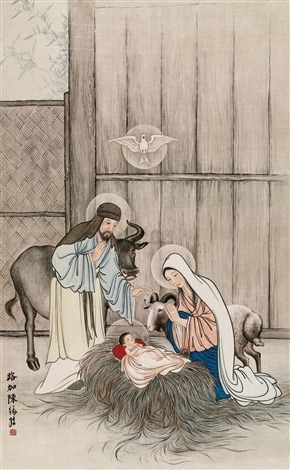
Traditional Chinese Catholic depiction of the Nativity scene
#chinese folklore#folk religion#Chinese Catholic#Catholicism#Asian#chinese painting#religious art#folk catholicism#folk Catholic#nativity
41 notes
·
View notes